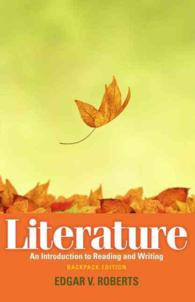- ホーム
- > 洋書
- > 英文書
- > Philosophy
Full Description
This book challenges the long-standing presumption that serious philosophical engagement with film and television must be theoretical. It demonstrates, by example, how philosophy of film and film studies can move beyond the methodological assumption that understands philosophical to mean theoretical. In seventeen specially commissioned essays, one in-depth interview, and one reprint, leading philosophers and film scholars exploit the approaches, arguments, and insights of Ludwig Wittgenstein, Stanley Cavell, Iris Murdoch, Augustine, Berys Gaut, Noël Carroll, and Ordinary Language Philosophy, in exploring, amongst others, Gravity, Lone Star, The Handmaid's Tale, Le notti di Cabiria, Dunkirk, L'Année dernière à Marienbad, Visitors, The Night it Rained, Philadelphia Story, Shoah, Mary Magdalene, Psycho, Blue Jasmine, Three Colours: Red, War Games, and Histoire(s) du Cinéma. In so doing, this collection argues forthe power of theory-free philosophy and film studies as a way to expand our humanistic understanding.
Contents
1. Introduction: Philosophy of Film, With and Without Theory Craig Fox and Britt Harrison.- Part One: Doing Without Theory Yet Still Doing Philosophy.- 2. The Procrustean Bed of Theory: In Conversation with Richard Allen and Malcolm Turvey Richard Allen, Malcolm Turvey, Craig Fox, and Britt Harrison.- 3. It All Depends: Some Problems with Analytic Film Theorising from the Perspective of Ordinary Language Philosophy Andrew Klevan.- 4. Lone Star: Ambiguity as a Philosophical Given, and a Philosophical Virtue Katheryn Doran.- 5. No Theory in Marienbad Constantine Sandis.- 6. Film and the Space-Time Continuum Part Two: The Appeal of - and to - Wittgenstein.- 7. Ordinary Returns in Le notti di Cabiria John Gibson.- 8. Wittgensteinian film-as-philosophy exemplified: Exploring the exploration of point-of-view in Cuaron's space-exploration film Gravity Rupert Read.- 9.On Films that Think by Seeing Frictionally: Toward a Wittgensteinian Philosophy of Film Carla Carmona.- Part Three: Revisiting - and Reconsidering - Cavell.- 10. Knowing or Not-Knowing in the Cinema? Rethinking Cavell's Image of Skepticism David Macarthur.- 11. Cavell, Experiences of Modernism, and Kamran Shirdel's The Night it Rained Craig Fox.- 12. The Same Again, Only a Little Different: Stanley Cavell's Two Takes on The Philadelphia Story William Rothman.- Part Four: Seeing Faces, Finding Others.- 13. Seeing One Another Anew with Godfrey Reggio's Visitor Eran Guter and Inbal Guter.- 14. A Punctum Scene in Shoah Rob van Gerwen.- 15. Mary Magdalene and Murdochian Film Phenomenology Lucy Bolton.- Part Five: Cinematic Investigations.- 16. Cinematic Invisibility: The Shower Scene in Hitchcock's Psycho James Conant.- 17. Entertaining Unhappiness Sebastian Sunday.- 18. In Kieślowski's Restaurant des Philosophes: determinism and free will under surveillance Colin Heber-Percy.- 19. Loving The Characters, Caring for The Work: Long Term Engagement with TV Serials Iris Vidmar Jovanović.






